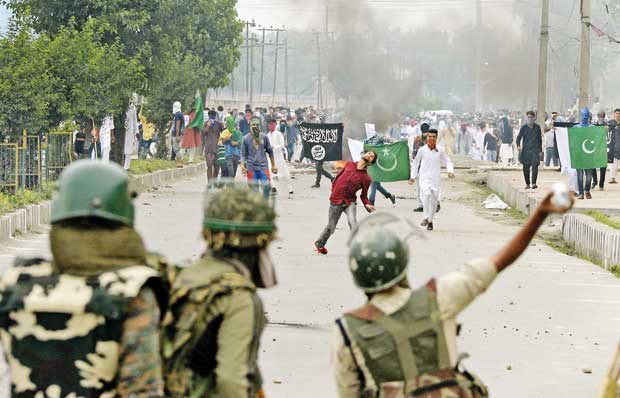Reply To:
Name - Reply Comment
Last Updated : 2024-04-20 00:00:00

Apart from poverty and corruption, violence rooted in religious intolerance has become a hallmark of South Asian countries. And, as in the case of poverty and corruption, the State and the polity are complicit in violent religious intolerance.
In Hindu-majority North India, cow protection vigilantes called Gau Rakshaks lynch Muslims with impunity, alleging that they ate beef or were taking cattle for slaughter. In Sunni-Muslim majority Pakistan, a loosely worded blasphemy law is used to arrest, prosecute and “sentence to death” non-Sunni Muslim minorities and non-Muslims like Christians and Hindus. Mobs have no compunction about lynching suspects and society and polity view lynching as natural justice.
In Muslim-majority Bangladesh, secular bloggers, atheists and gay rights activists were branded as “enemies of Islam” and murdered in cold blood till last year when Prime Minister Sheikh Hasina came down on the perpetrators with an iron hand. In Sri Lanka, the State machinery and the polity are silent spectators as a Buddhist monk freely indulges in hate speech and exhorts his followers to burn Muslim shops and mosques.
Despite claims to the contrary and the existence of democratic structures and laws, the South Asian state is quintessentially an institution of the majority community for the majority community. The State looks on nonchalantly or even approvingly, as members of the majority community attack and even kill minorities and dissenters. The State tacitly approves these acts in the belief that stopping  the attackers or punishing them will alienate it from the majority community.
the attackers or punishing them will alienate it from the majority community.
In India, murdering Muslims for trading in cattle or eating beef is seen by the ruling dispensation as implementation of its Hindutva ideology - the ideology of Hindu nationalism which seeks to establish Hindu supremacy through the subjugation of minorities and dissenters. The perpetrators of violence are either not arrested or are let off the hook.
In Pakistan, a simple allegation of “blasphemy” (even in the slightest form), is enough for arrest and prosecution. Since the accuser has the upper hand, the accused is sentenced to death as the law makes it mandatory. The courts themselves deem it a religious duty to be harsh on the accused as blasphemy is deemed an unpardonable crime in Pakistan.
Alleged blasphemers are sometimes lynched by self-righteous mobs or are killed by fellow prisoners or jail guards. These murders go unpunished as they are deemed by society and the polity to be “meritorious.”
"In a society where primordial loyalties are strong, religious affinity proved to be a more attractive and effective rallying point than class interest"
Communalism has been at the core of politics in the Indian sub-continent from pre-independence days and was the basis of the division of the Indian sub-continent into a largely Hindu India and a  Muslim Pakistan. But under the enlightened leadership of Mahatma Gandhi and Jawaharlal Nehru, independent India chose to be secular and was largely so, till economic crises and Indira Gandhi’s authoritarian rule set off political and social unrest which spawned communalism.
Muslim Pakistan. But under the enlightened leadership of Mahatma Gandhi and Jawaharlal Nehru, independent India chose to be secular and was largely so, till economic crises and Indira Gandhi’s authoritarian rule set off political and social unrest which spawned communalism.
Hindu chauvinistic/nationalist forces, which were dormant after independence, began to find favour among a section of the middle class as the Left of Centre Congress and the Leftist parties jaded in the 1970s and 1980s. In a society where primordial loyalties are strong, religious affinity proved to be a more attractive and effective rallying point than class interest.
In the 1970s and 1980s, Hindu chauvinistic forces drew sustenance from the rise of fundamentalist Islam emanating from the oil-rich Middle East. In the mid-1980s, India’s arch enemy Pakistan, got highly Islamized under the rule of Gen.Zia-ul-Haq. Its fall out was felt in the Muslim-majority Indian state of Kashmir, where protests against Indian rule reached new heights.
However, it took several years for the Hindutwa forces to capture State power. The Hindu nationalist Bharatiya Janata Party (BJP) to come to power at the Centre virtually on its own, only in March 2014.
"Sharpening the Hindu-Muslim divide, Modi as Prime Minister, has given up the long established tradition of holding Iftar parties during Ramazan"
Once ensconced in power, the BJP and its ideological allies called “Sangh Parivar” set about whipping up Hindu nationalism to consolidate and expand its political base. The easiest way of doing so was to target the Muslims, the quintessential “other” in India, and the community which broke up India to establish a separate Muslim Pakistan.
The ancient concept of the “Holy Cow” and the ban on beef eating were revived, not to safeguard the cow, but to target the Muslims who eat beef and slaughter cows.
“Gau Rakshaks” or cow vigilante groups mushroomed to number several thousands by 2016. When tipped off, these vigilante groups would attack and lynch the suspected Muslims. Those killed so far range from 58 year old Mohamand Ikhlaq from Dadri in Uttar Pradesh, to 15 year old Hafiz Junaid in Ballabhgarh near Delhi.
The State apparatus sides with the vigilantes under the cloak of the Indian constitution which bans the slaughter of milch cattle, though cattle taken for slaughter don’t yield milk. A recently passed law, which makes it very difficult to sell cattle in the market, is meant to destroy the meat industry which is largely in the hands of Muslims. According to the Economist armed Gau Rakshaks prey on cattle transporters on highways, extorting money at the rate of Indian Rs. 200 per head of cattle.
"Communalism has been at the core of politics in the Indian sub-continent from pre-independence days and was the basis of the division of the Indian sub-continent into a largely Hindu India and a Muslim Pakistan"
Alienating the Muslims is no longer considered politically costly. Modi proved in the Uttar Pradesh State Assembly elections recently that polls can be won comfortably without fielding a single Muslim candidate.
Sharpening the Hindu-Muslim divide, Modi as Prime Minister, has given up the long established tradition of holding Iftar parties during Ramazan. He also makes it a point not to attend Iftar parties, even if hosted by the President of India. Taking the cue from him, other parties are also giving up the practice, thus giving up even a symbolic acknowledgment of India’s largest minority and its second largest religious community.
"The perpetrators of violence are either not arrested or are let off the hook"
Meanwhile in Pakistan, efforts to revise the blasphemy law, which have led to a rash of convictions and lynching, have failed in the face of opposition from ultra radical Islamic groups and Mullahs who consider it inviolable.
Those seeking reform or pleading for mercy towards alleged blasphemers are murdered. Punjab Governor Salman Taseer and Minority Affairs Minister Shahbaz Bhatti were assassinated for this, and the assassins were publicly lauded. This despite the fact that a survey conducted by the “Nation” newspaper found that 68% wanted the blasphemy law repealed.
In Bangladesh, Prime Minister Sheikh Hasina’s zero tolerance of religious killings after the July 1 ,2016 massacre in a posh restaurant in Dhaka, has put an end to such killings, clearly showing what the State could do if it wanted to control religious killings.

Add comment
Comments will be edited (grammar, spelling and slang) and authorized at the discretion of Daily Mirror online. The website also has the right not to publish selected comments.
Reply To:
Name - Reply Comment
On March 26, a couple arriving from Thailand was arrested with 88 live animal
According to villagers from Naula-Moragolla out of 105 families 80 can afford
Is the situation in Sri Lanka so grim that locals harbour hope that they coul
A recent post on social media revealed that three purple-faced langurs near t